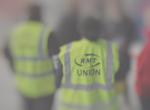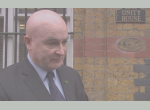RMT press release, issued today
Ministers have never tested value of public-sector alternative, union reveals
THE TIME has come to end the ‘great rail-fares rip-off’ and sack the privateers responsible for a ‘legalised scam’ that has made private shareholders rich at the expense of passengers and rail workers’ jobs, Britain’s biggest rail union says today.
As monopoly rail operators prepare to implement another round of punishing inflation-busting fares hikes of between six and 11 per cent, RMT reveals the stark figures that show how the big five transport groups are converting fare hikes into bumper profits, fuelling dividend increases of at least ten and as high as 33 per cent (figures attached).
The union also reveals that the government, in answer to parliamentary questions, has admitted that it has never tested whether rail services could be run more efficiently in the public sector – despite claiming that rail franchising delivers value for money (details below).
“Passengers being told to fork out huge increases in fares and season tickets for overcrowded services have every reason to ask how the operators can rake off such huge amounts of their money as ‘profits’,” RMT general secretary Bob Crow said today.
“The government has used huge sums of public money to prop up and nationalise failing banks, but when it comes to the railways there is more than enough evidence to show that bringing them back into the public sector would leave taxpayers and passengers better off.
“It seems that the rail privateers want everyone else to tighten their belts so that their shareholders can keep their snouts in the trough – yet the government insists that the set-up delivers value for money.
“When rail users are facing another massive fares hike and rail workers are threatened with redundancy just to protect the profits, we all have the right to ask: value for money for whom?
“Parliament’s own transport select committee has said that no amount of tinkering can resolve the fundamental flaws in the franchising system, and the time has come to bring them all back into the public sector where the belong,” Bob Crow said.
ends
Parliamentary questions follow, figures attached below
Rail fares and profits
From questions to transport minister Paul Clark tabled by John McDonnell MP
John McDonnell: To ask the Secretary of State for Transport whether his Department has made an assessment of the value for money of (a) integrating rail infrastructure and operations in the public sector and (b) separating train and station operations from rail infrastructure maintenance and renewals.
Paul Clark: No such formal assessment has been made. It is generally accepted that the structures put in place at privatisation were flawed. The 2004 Rail White Paper and 2005 Railways Act set out a new streamlined structure, specified by the Government and delivered by the private sector, under which rail investment is based on affordability and value for money as determined by the independent Office of Rail Regulation. This structure provides coherent and effective management and delivers safe, reliable railways that work efficiently. The new arrangements provide much-needed stability for the industry as a whole.
John McDonnell: To ask the Secretary of State for Transport whether his Department has a comparator to assess the relative value for money of private and public operation of railway passenger services.
Paul Clark: The Government's policy is that rail passenger services are provided by the private sector through competition to operate publicly-specified franchises. There are no public operations which could provide the yardstick for a comparator.
John McDonnell: To ask the Secretary of State for Transport what assessment his Department has made of the value for money of operating rail passenger services in the public sector after each passenger franchise expires.
Paul Clark: The Government's policy is that rail services are provided by the private sector to a specification developed in the public sector; therefore, no formal assessment has been made of the value for money of operating rail passenger services in the public sector.
- Press releases on this site are taken from www.rmt.org.uk.
- 6792 reads
> RMT National News
- ‹ previous
- 2 of 12
- next ›





